Jerusalem protest ends largely peacefully; group from Bratslav sect, angry over Uman pilgrimage, join in; man in passing car said to brandish pistol at Herzliya activists
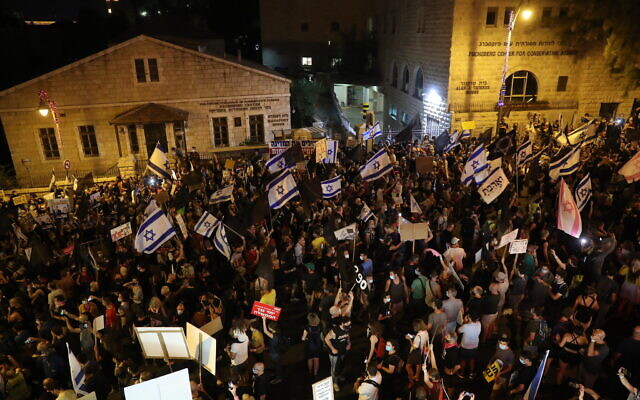
Thousands of Israelis took part in nationwide protests against Prime Minister Benjamin Netanyahu on Saturday evening, with the largest gathering taking place in Jerusalem where demonstrators have staged weekly rallies across from the premier’s residence. Some 200 Bratslav hasidim joined the Jerusalem rally, angry at government policy aimed at preventing their traveling to Uman, Ukraine, for an annual pilgrimage to the gravesite of a venerated rabbi.
Media reports indicated some 20,000 took part in the demonstration in Jerusalem. Meanwhile organizers, citing bracelets they hand out to to all participants, said attendance was at 37,000.
Protests ended largely peacefully, in stark contrast to last week’s events that saw many violent incidents, and claims of police brutality by participants. Police officials said protesters had listened to instructions and stopped making noise at 11:00 p.m., so they did not have to use force.
Police said 16 people were detained or arrested for disturbing public order or assaulting policemen. Several people received fines for blocking roads after police called on demonstrators to disperse at midnight.
Smaller protests were also held at highway overpasses and intersections across Israel. And, for the first time, a number of small protests were also held in 17 cities across the world in solidarity with the Israeli protests, including in Berlin and New York, Kan reported.
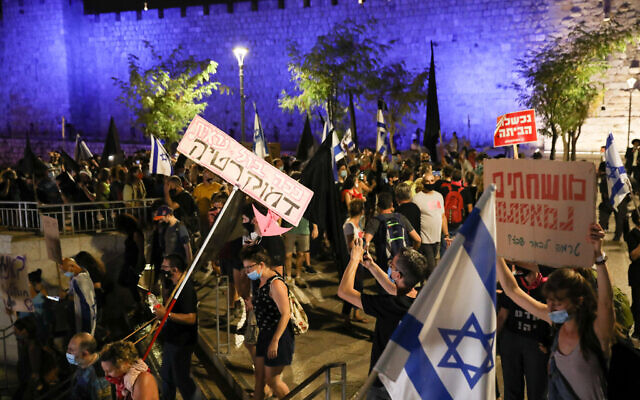
This was the 11th consecutive week in which demonstrators turn out to voice opposition to Netanyahu, specifically his indictment on corruption charges and his handling of the coronavirus pandemic.
There have been incidents of violence at some protests over these past weeks. On Saturday, protesters in Herzliya said a man brandished a pistol as he drove by them at a junction in the city, in an incident caught on video. The protesters are expected to file a police complaint.
The mass protest in Jerusalem on Saturday took place amid tensions with police over their handling of the demonstration last week, where scuffles broke out and some 30 people were arrested amid allegations of incitement and police violence.
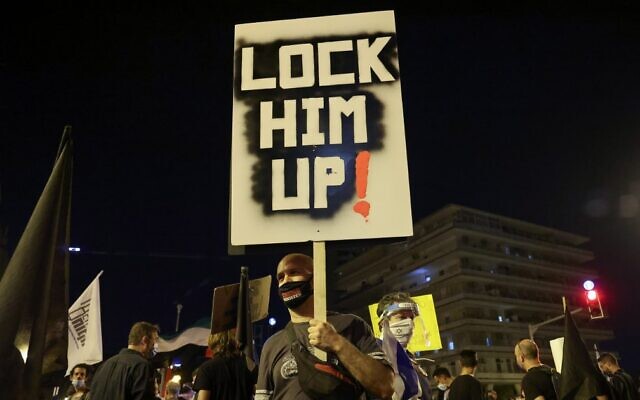
Starting at 8:00 p.m., protesters in Jerusalem marched down Jaffa Street in Jerusalem toward the city center, calling for the prime minister to resign over his indictment on graft charges. Netanyahu has repeatedly denied wrongdoing.
The demonstrators began marching from the Chords Bridge at the entrance to the capital and made their way toward the Prime Minister’s Residence to join up with the main protest, which appeared to be the largest anti-Netanyahu demonstration in Jerusalem so far, according to Times of Israel reporter Aaron Boxerman.
Police said they allowed the march to take place “even though it wasn’t coordinated as is necessary.”
At the main rally, demonstrators crowded throughout Paris Square and on Keren Hayesod and Agron streets, with some carrying signs reading “enough with division!” and “it’s not political, it’s just criminal.”
In an unexpected development, a group of Hasidic Jews demanding to be allowed to travel to the Ukrainian city of Uman for Rosh Hashanah joined the anti-Netanyahu protest in Jerusalem later Saturday, after participating in a separate demonstration against the decision to prevent their travel.
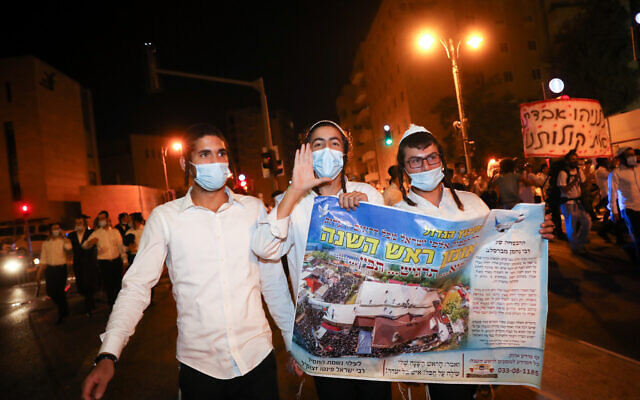
The group of some 200 Bratslav Hasidim was received with applause and cheers by the other demonstrators, according to footage from the protest.
המחאות מתמזגות לכיכר אחת: כ-200 חסידי ברסלב הגיעו לכיכר פריז והתקבלו במחיאות כפיים על ידי המפגינים@SuleimanMas1 @AkivaWeisz pic.twitter.com/CnHVggGZGU
— כאן חדשות (@kann_news) August 29, 2020
One of the protest leaders, Or-ly Barlev, tweeted a message to her followers Saturday afternoon saying that there were plans circulating to sit quietly without making noise after 11:00 p.m, when police usually begin dispersing the protests. The rationale, it seemed, was that if protesters merely sat without making noise, the police would have no reason to disperse them.
Saturday night’s protests ended at around 1 a.m. after police evacuated a few hundred people who remained at the protest site after police called on them to disperse starting at midnight. These evacuations apparently took place without major clashes.
Ahead of the protest, one organizer told the Times of Israel that the biggest fear going in was that the violence would escalate and someone would get seriously injured. Yishai Hadas, a leader of Crime Minister, one of the main groups leading the weekly mass demonstrations against Netanyahu, said he hoped there would not be an “escalation in police violence” on Saturday, which would change this situation.
Hadas was one of three protest representatives at the Knesset’s Internal Affairs and Environmental Protection Committee hearing on Monday, which focused on police violence. The hearing was Hadas’ idea, and featured testimony by both protesters and Jerusalem police chief Doron Yedid.
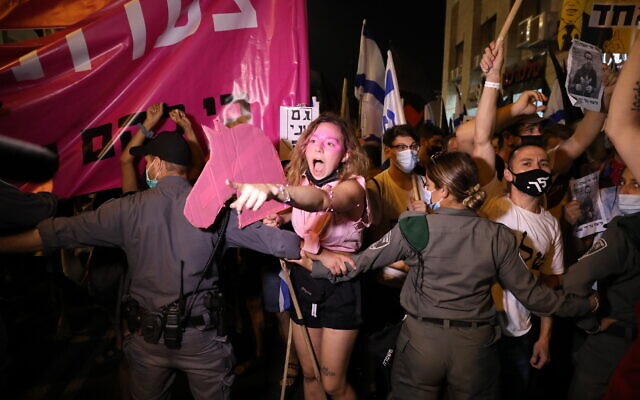
The hearing was called after public outcry following the events of last Saturday, especially the conduct of police Chief Superintendent Niso Guetta.
In one widely circulated video, Guetta was seen shoving and hitting one protester and then pushing people to the side as he chased down another demonstrator, whom he hit in the face before pushing him to the ground. Guetta and other officers then dragged the person along the pavement before hauling him off.
Other photographs showed him kneeling on a supine protester and pushing his head to the ground with his elbow. Guetta claims he was assaulted by the demonstrators and that he did not use excessive force.
Earlier this week, Deputy State Prosecutor Nurit Litman signed a new policy directive aimed at reducing the number of protesters brought before the courts. The directive calls on police to scale back the number of protesters charged with minor offenses such as participation in illegal gatherings, the Haaretz daily reported. This type of charge would be reserved for more serious incidents, such as when a protester commits an act of violence.
As reported by The Times of Israel
